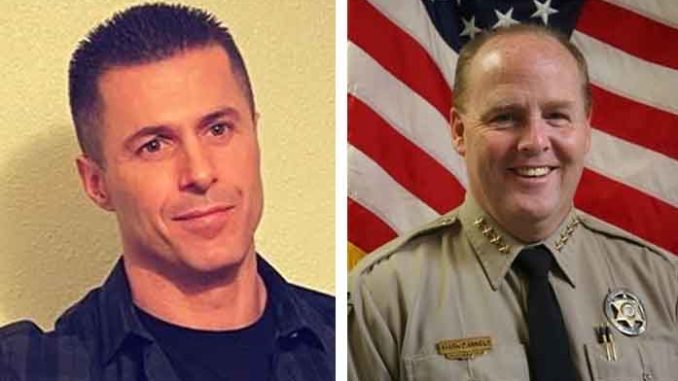
A federal judge will rule next month whether to dismiss a wrongful arrest lawsuit filed against current Cochise County Sheriff Mark Dannels. The lawsuit was brought by a man from Coquille, Oregon who was released from prison after questions were raised about a murder investigation overseen by Dannels, who was then Coquille’s police chief.
Last year, Nicholas James McGuffin sued multiple former and current city, county and state law enforcement officials in Oregon involved in investigating the June 2000 disappearance of his girlfriend Leah Freeman, whose decomposed body was found a few weeks later. Another defendant is the Vidocq Society, a charitable organization that provided investigative and “profiler” services in connection to Freeman’s death.
McGuffin was arrested in 2010 and subsequently convicted of manslaughter, but his conviction was overturned in late 2019 based on another man’s DNA evidence found on one of Freeman’s shoes. His lawsuit alleges authorities ignored other suspects, lied about witness statements, and misrepresented, hid, or ignored evidence related to Freeman’s disappearance and death.
The 18 various defendants are referred to in court documents as the “Municipal,” “State,” and “Vidocq” defendants. All three groups have filed motions for dismissal, which U.S. District Judge Mustafa Kasubhai will decide following oral arguments on Feb. 25. To survive a motion to dismiss, McGuffin’s federal complaint must allege enough facts to state a claim for relief that is plausible on its face.
Dannels and the other Municipal defendants, which include the City of Coos Bay and Coos County, argue McGuffin failed to allege “specific facts” to support his claims against each defendant. And that many of his claims fall under qualified immunity or are barred by a two-year statute of limitations.
The State defendants contend they were not involved in McGuffin’s arrest or prosecution, nor were they involved in any alleged constitutional violations. Meanwhile, the Vidocq defendants argue for dismissal on the grounds that they “merely offered local law enforcement a perspective, their ideas, and a fresh set of eyes on the evidence obtained by law enforcement during the decade long investigation.”
Kasubhai initially set several deadlines after McGuffin’s case was initiated in July, but those are on hold for now. The judge could grant some or none of the dismissal motions.
If any defendants remain after Feb. 25 then they will file a formal answer to McGuffin’s claims and the judge will set new case management deadlines, including a cutoff for McGuffin to add other defendants to the case.
Court records show that on Aug. 23, 2010, Dannels was in attendance with a reporter from ABC’s 20/20 as McGuffin was arrested. In 2011, a jury returned a not guilty verdict on murder but convicted McGuffin of manslaughter, resulting in a 10 year prison sentence.
McGuffin was released in 2019 after his conviction was overturned due to the fact the defense was never advised before or at trial that the Oregon State Police crime lab found DNA evidence on one of Freeman’s shoes back in 2000. The DNA belonged to a male, but not McGuffin.
In 2015, McGuffin’s appellate attorney learned of the DNA evidence but it took several court proceedings before a judge overturned McGuffin’s conviction.
Dannels had been with the Cochise County Sheriff’s Office for 20 years when he left in 2008 to helm Coquille’s police department. Solving Freeman’s years-old murder was a priority, Dannels told the community upon his arrival.
McGuffin always denied any involvement with his girlfriend’s disappearance. Nor was there any physical evidence connecting him to the area where Freeman’s body was found.
There was, however, two items of evidence a judge pointed to when she overturned McGuffin’s conviction. One was a gray-colored paint chip found on Freeman’s shirt. The other was one of Freeman’s gym shoes with her blood and the DNA of an unknown male.
The judge who overturned the McGuffin’s conviction noted the jury’s verdict would “likely” have changed if they had known about the DNA evidence.
McGuffin’s federal lawsuit alleges various investigators who worked the case before Dannels became police chief violated his constitutional rights. It also alleges that when Dannels arrived in Coquille, he created a cold case team which continued with “a false narrative aimed at convicting McGuffin.”
The lawsuit seeks financial damages for McGuffin and his minor child. In the meantime, Freeman’s murder investigation remains open.
Dannels left Coquille in 2011 and returned to Cochise County where he became sheriff in 2012. When interviewed after McGuffin’s release, Dannels restated his belief that the boyfriend was “directly responsible” for Freeman’s death. He also pointed out the judge’s ruling did not clear McGuffin.
“They didn’t say Nick was innocent,” Dannels told ABC’s 20/20. “They didn’t say that he didn’t kill Leah Freeman.”
Another of the Municipal defendants is Cochise County Sheriff’s deputy Raymond McNeely, who worked with Dannels in Coquille before joining CCSO in 2015. Coquille’s insurance carrier is required to provide legal representation for both men.
